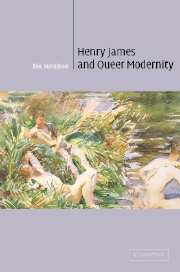Book contents
- Frontmatter
- Contents
- Acknowledgments
- List of abbreviations
- Introduction
- 1 Indiscreet anatomies and protogay aesthetes in Roderick Hudson and The Europeans
- 2 The elusive queerness of “queer comrades”: The Tragic Muse and “The Author of ‘Beltraffio’”
- 3 The Turn of the Screw, or: The Dispossessed Hearts of Little Gentlemen
- 4 Masculinity “changed and queer” in The Ambassadors
- 5 Gratifying “the eternal boy in us all”: Willa Cather, Henry James, and Oscar Wilde
- 6 “The other half is the man”: the queer modern triangle of Gertrude Stein, Ernest Hemingway, and Henry James
- Coda: “Nobody is alike Henry James.” Stein, James, and queer futurity
- Notes
- Bibliography
- Index
Introduction
Published online by Cambridge University Press: 22 September 2009
- Frontmatter
- Contents
- Acknowledgments
- List of abbreviations
- Introduction
- 1 Indiscreet anatomies and protogay aesthetes in Roderick Hudson and The Europeans
- 2 The elusive queerness of “queer comrades”: The Tragic Muse and “The Author of ‘Beltraffio’”
- 3 The Turn of the Screw, or: The Dispossessed Hearts of Little Gentlemen
- 4 Masculinity “changed and queer” in The Ambassadors
- 5 Gratifying “the eternal boy in us all”: Willa Cather, Henry James, and Oscar Wilde
- 6 “The other half is the man”: the queer modern triangle of Gertrude Stein, Ernest Hemingway, and Henry James
- Coda: “Nobody is alike Henry James.” Stein, James, and queer futurity
- Notes
- Bibliography
- Index
Summary
So much of life is queer, if we but dare feel its queerness.
(Sherwood Anderson, Memoirs)As the most politically charged term in my title, with respect to both literary criticism and the realpolitik of contemporary culture, “queer” deserves primary attention among my definitional tasks, before I can begin to examine the questions that underlie this study. Although it is hard to generalize about a field as diverse and proliferating as queer studies, especially one that programmatically prides itself on constant self-querying and self-renovation, the current mood in this subdiscipline seems introspective, even uneasy, after a long decade of evolution. Originally, the conceptual terminology of “queerness” (or “queer”) drew its analytical and political force from the very quality that made it so appealing, as well, to Victorian and modernist authors and readers: a fluency or an indeterminacy of signification that was felt to be at once powerful and elusive. In Saint Foucault, for instance, David Halperin suggests that both the intellectual value and the subversive potential of queer depended on its being defined as indefinite, its referentiality mobile and contingent rather than fixed: “Queer is by definition whatever is at odds with the normal, the legitimate, the dominant. There is nothing in particular to which it necessarily refers. It is an identity without an essence … describing a horizon of possibility whose precise extent and heterogeneous scope cannot in principle be delimited in advance.
- Type
- Chapter
- Information
- Henry James and Queer Modernity , pp. 1 - 26Publisher: Cambridge University PressPrint publication year: 2003



